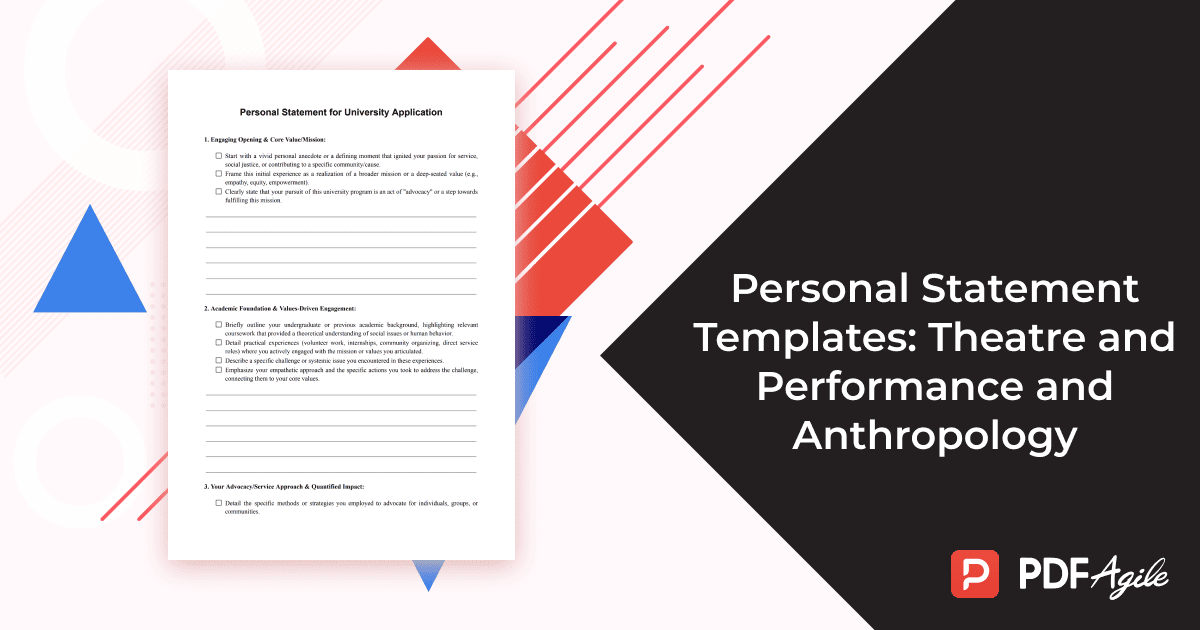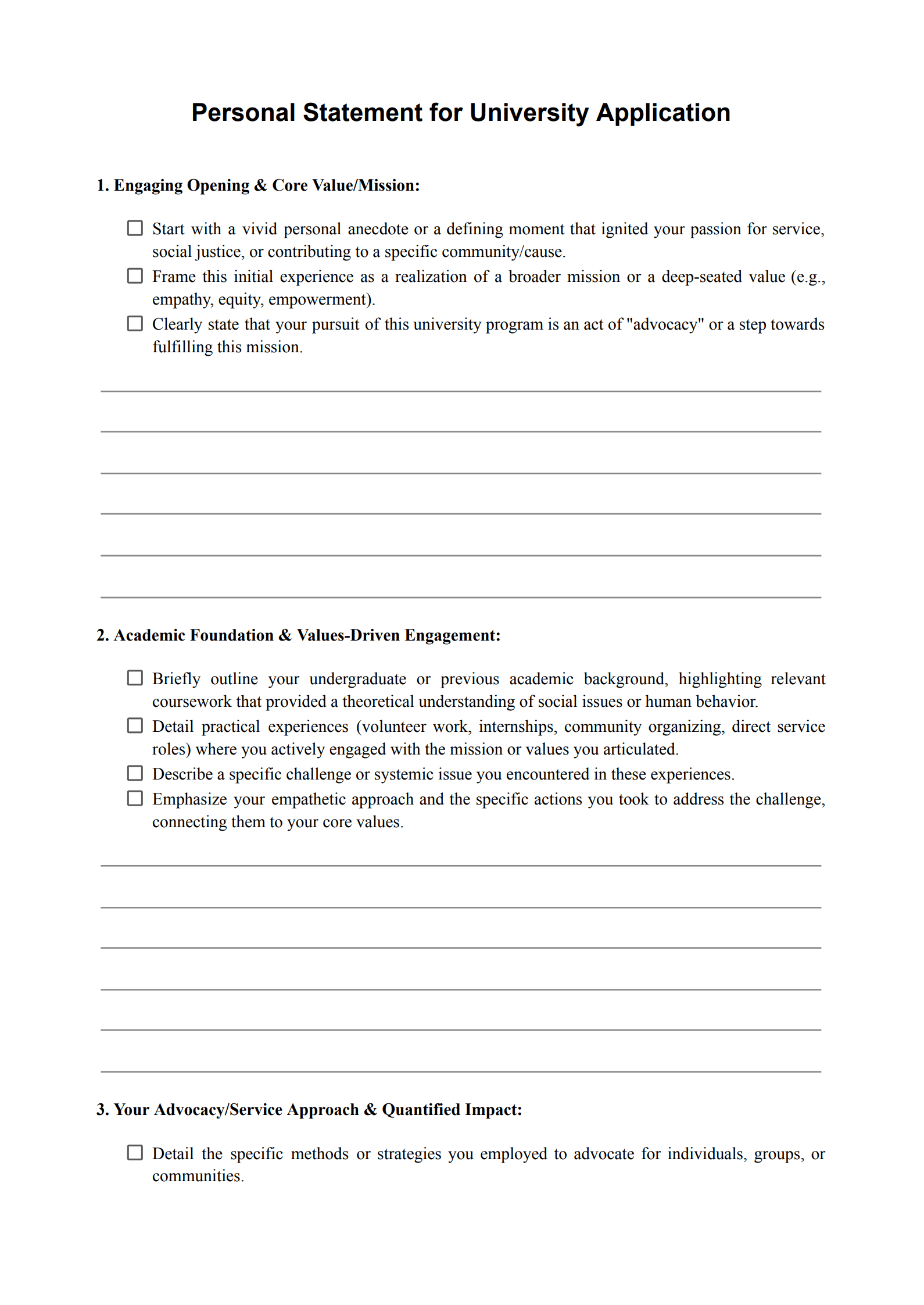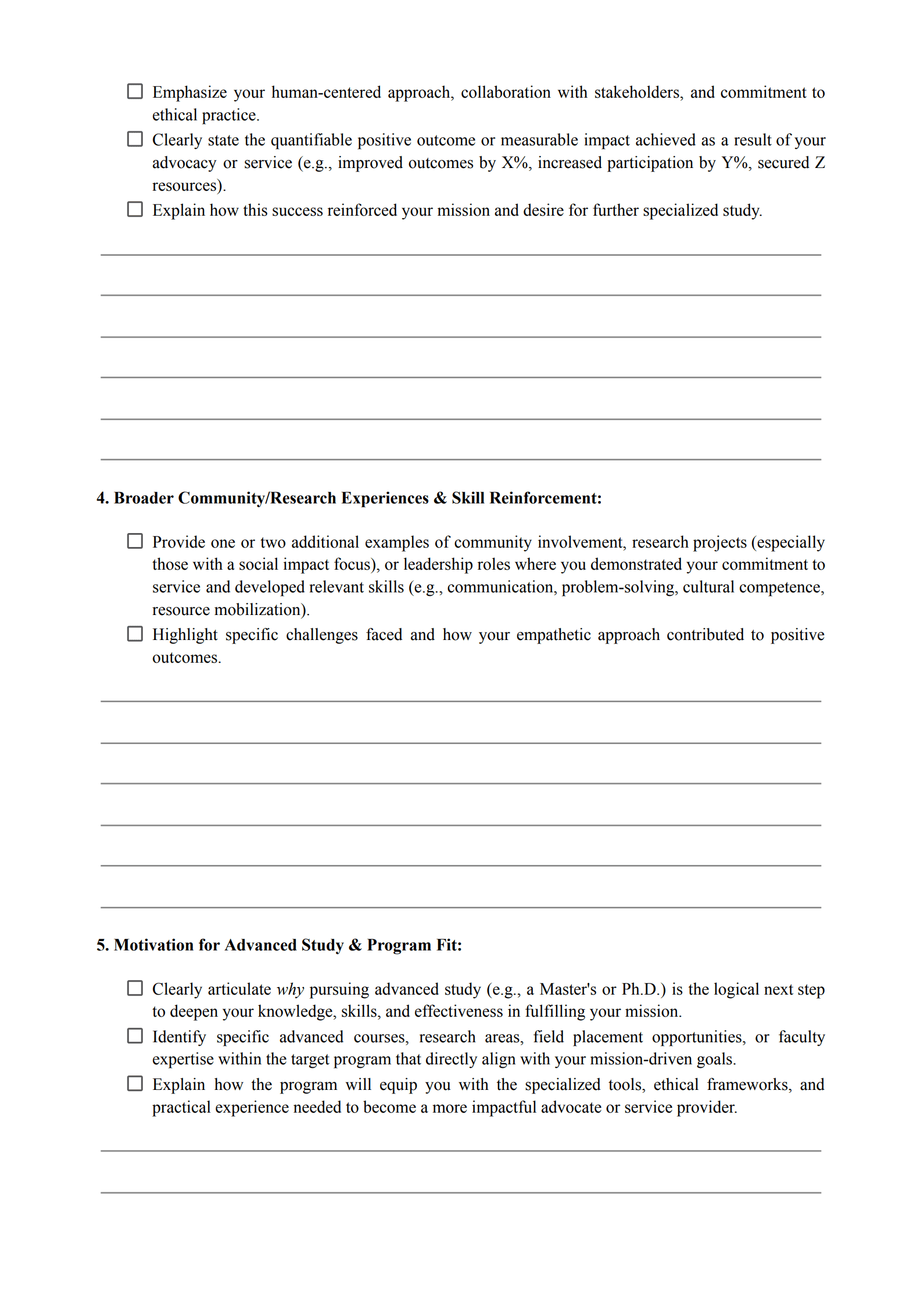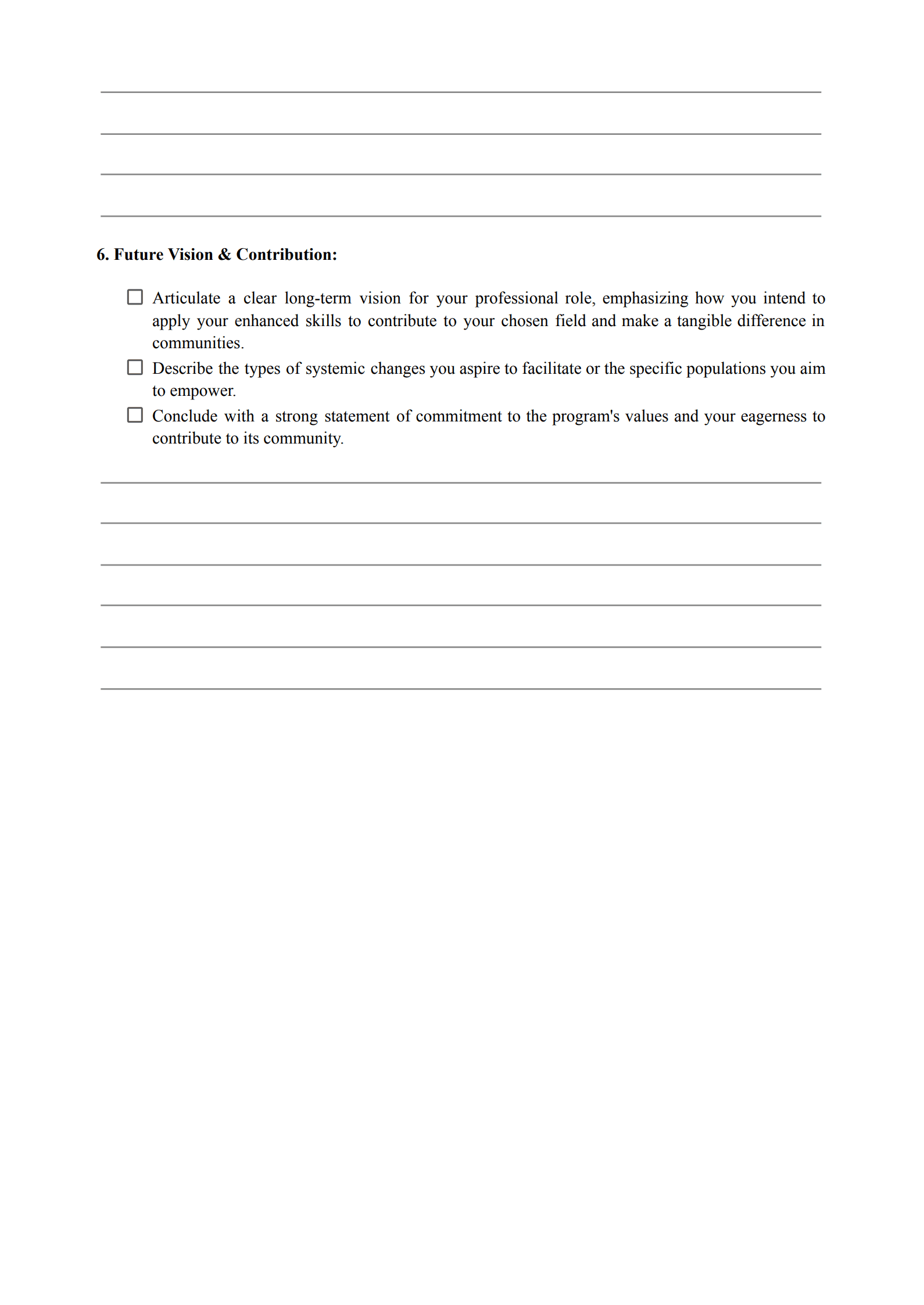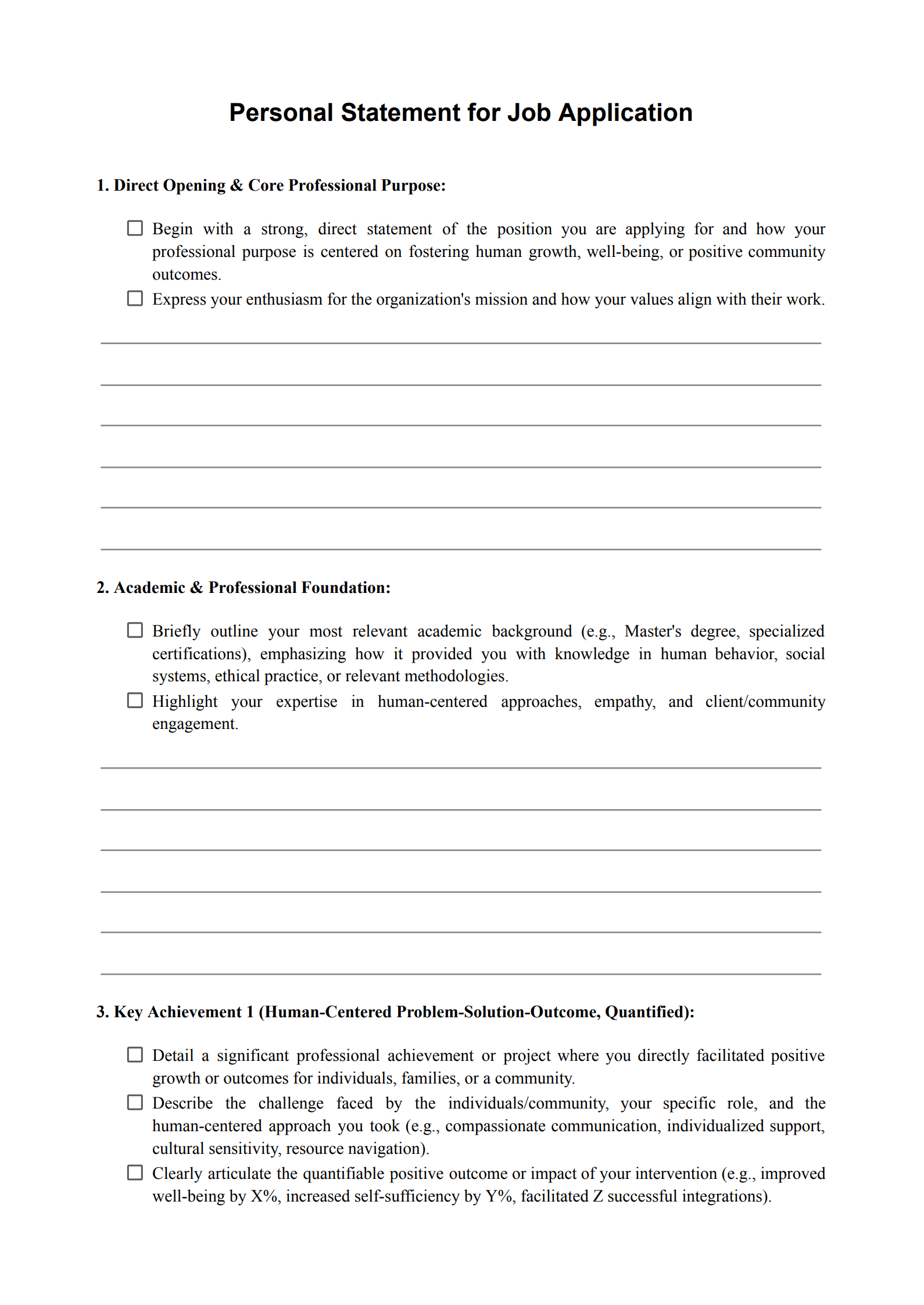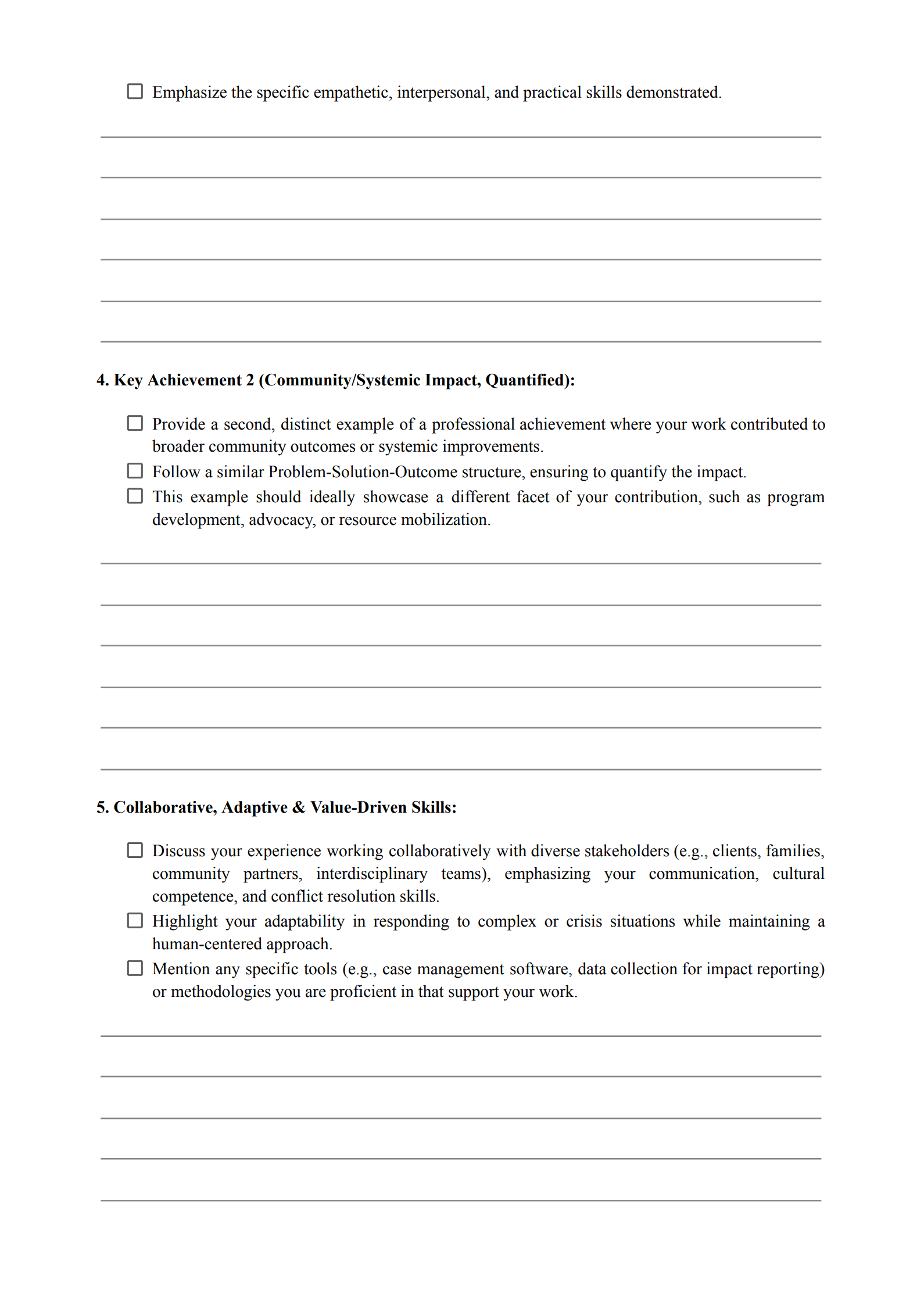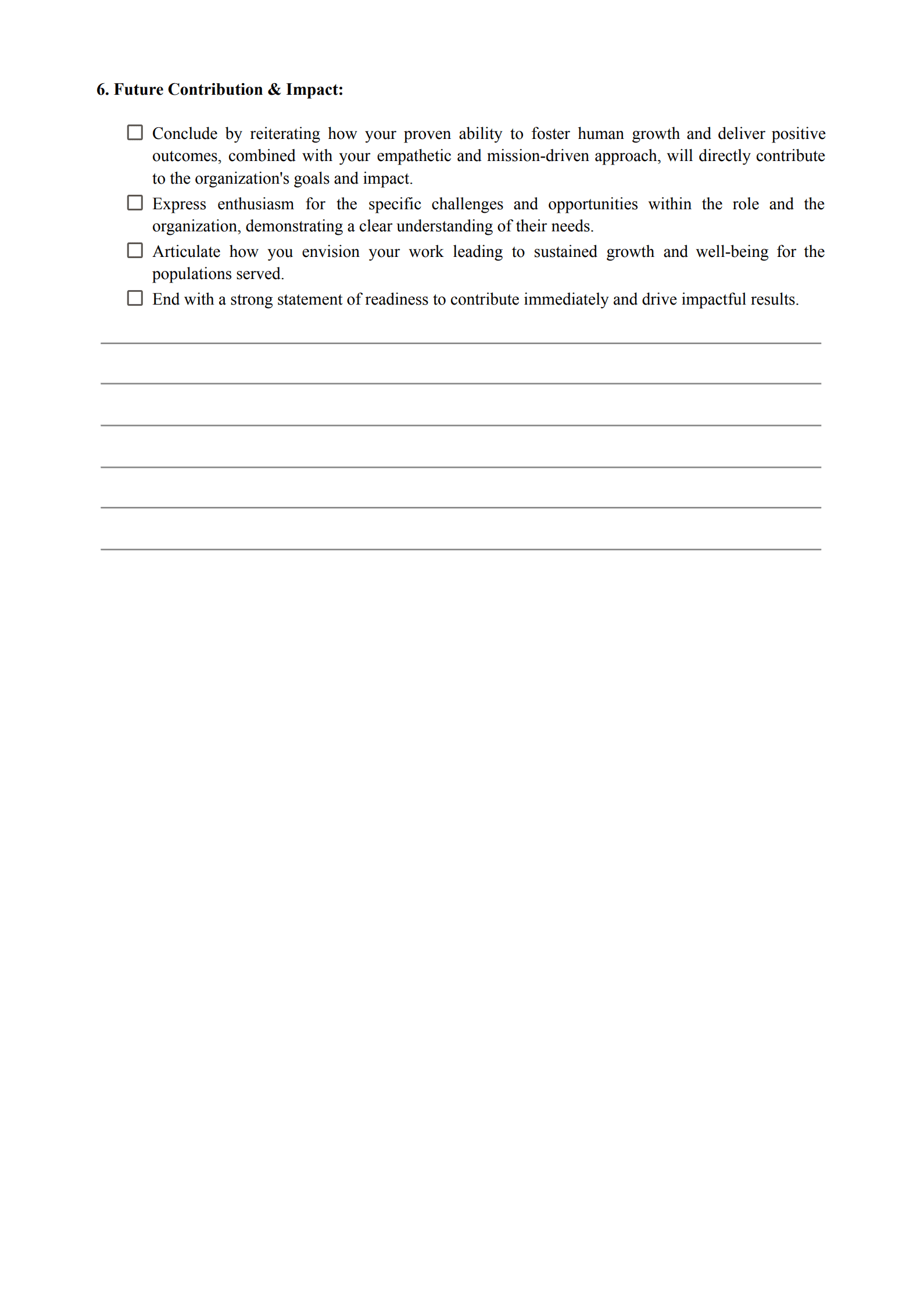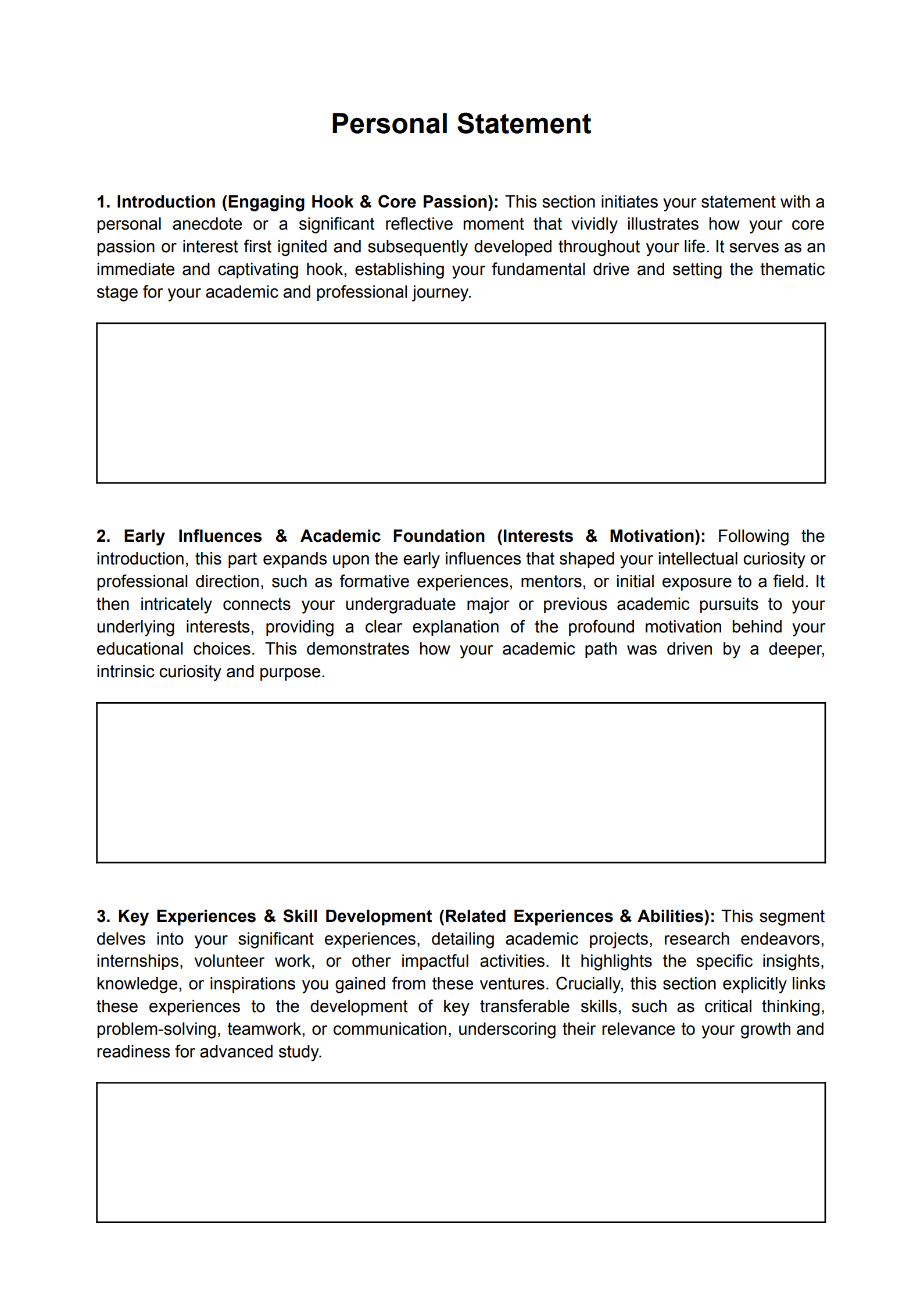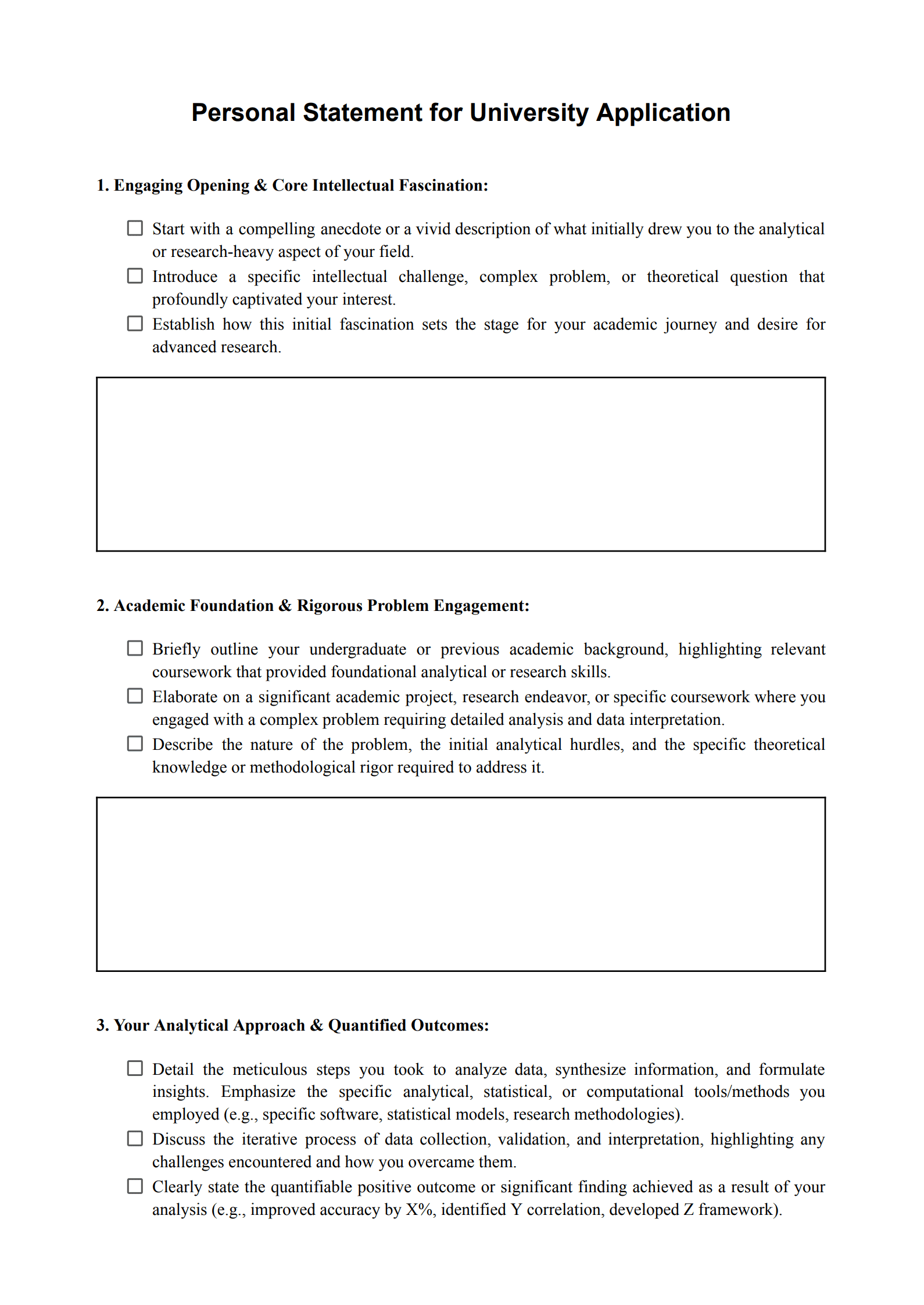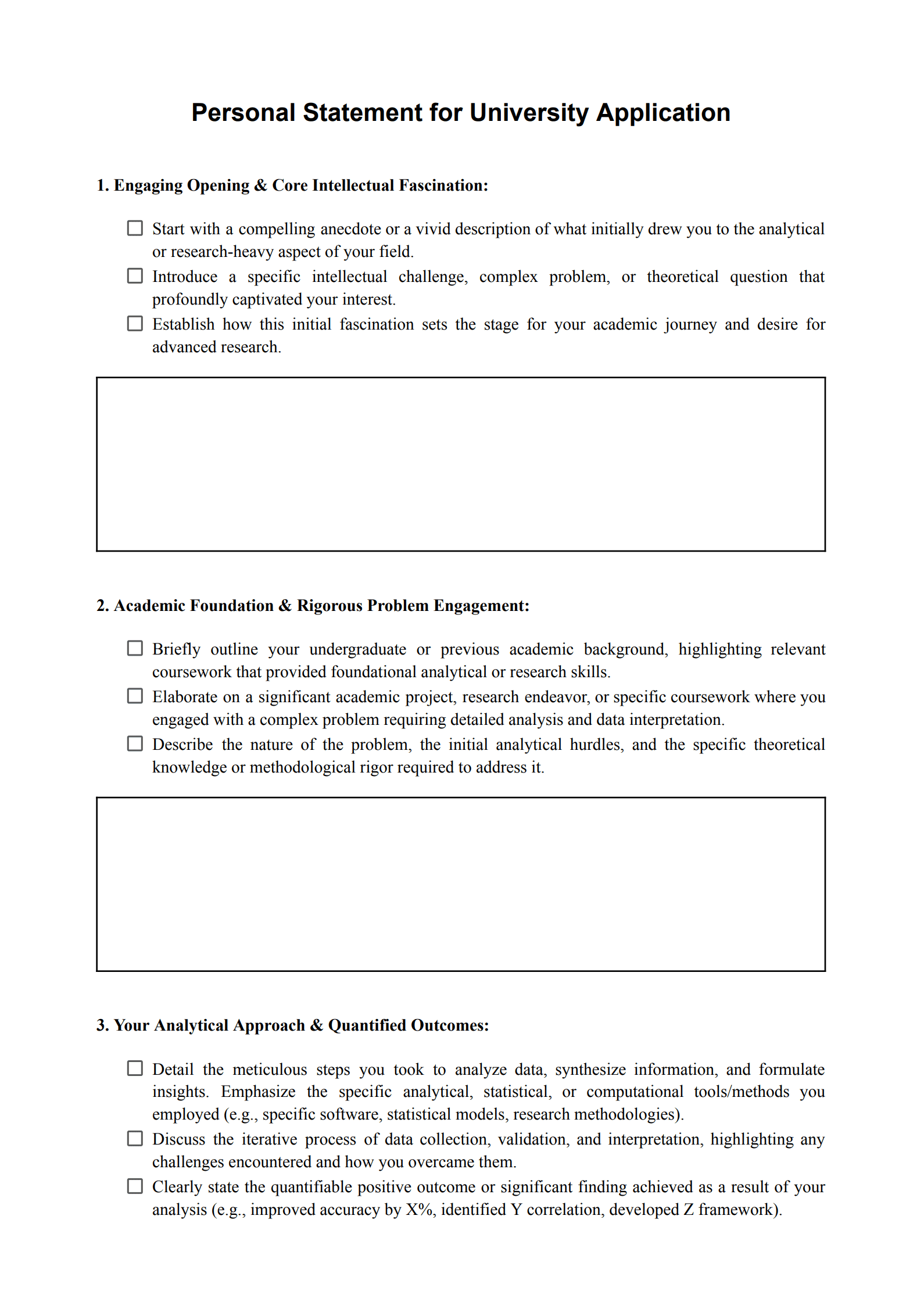In the competitive landscapes of university admissions and job applications, especially within fields that demand originality, interpretation, and a unique perspective like Theatre and Performance or Anthropology, your personal statement is your prime opportunity to articulate not just your qualifications, but your very essence as a creative and interpretive individual. Among the various approaches, the "Creative Identity" style stands out as particularly effective, allowing you to showcase your artistic thinking, passion-fueled self-expression, and innovative problem-solving.
What Should Be Stated in the Personal Statement?
Whether you're applying for a master's in directing or a role as a museum exhibit designer, a compelling personal statement should always convey several key elements:
Authentic Motivation: What truly ignited your passion for this field? Share a genuine story or experience that illustrates your deep connection to the subject.
Relevant Skills and Aptitude: Beyond listing them, demonstrate how you've applied critical thinking, problem-solving, analytical reasoning, communication, and specific technical or artistic skills.
Experiences in Action: Provide concrete examples of projects, roles, or scenarios where your creative or interpretive abilities were put to the test. Show, don't just tell, your capabilities.
Fit with the Program/Organization: Clearly articulate why this specific university program or job opportunity is the ideal next step for your unique journey. Show that you've done your research and understand their mission and values.
Future Vision and Contribution: How do you envision yourself growing within this field, and what impact do you aspire to make? Connect your personal goals to the broader aims of the institution or company.
Unique Voice and Identity: Especially for fields like Theatre and Anthropology, your statement should reflect your distinct perspective, creative approach, and passion-fueled self-expression. This is your chance to let your personality shine through.
Real-World Journeys: From Academia to Industry
To powerfully illustrate the "Creative Identity" approach, let's examine two distinct professional trajectories. Our first example, Applicant A, is an individual with a strong foundation in Theatre and Performance. Their passion for using the stage as a tool for social commentary led them to pursue a Master of Fine Arts (MFA) in Directing, with an ultimate goal of becoming a Stage Director for social change productions.
Personal Statement for Master's in Curriculum & Instruction
My journey into education began not in a traditional classroom, but in the vibrant, often chaotic, after-school programs of my local community center. I recall a particular moment while tutoring a bright 10-year-old, Maria, who consistently struggled with reading comprehension despite her obvious intelligence. Her school curriculum, designed for a different demographic, failed to connect with her lived experiences or address her specific learning needs. Witnessing her frustration, and the systemic barriers that left her feeling disengaged, ignited a profound sense of mission within me. It became clear that true education extends beyond imparting facts; it is an act of advocacy, a deliberate design of learning experiences that empower every child, regardless of their background, to unlock their full potential. This conviction, deeply rooted in empathy for underserved learners, solidified my ambition to pursue a Master's in Curriculum & Instruction, with a focus on equitable and inclusive design.
My undergraduate studies in Education provided me with a foundational understanding of pedagogical theories, child development, and classroom management. However, it was my practical engagements that truly shaped my mission-driven approach. As a volunteer teacher in a summer literacy program for immigrant children, I encountered firsthand the challenges of cultural and linguistic diversity in learning. The standardized materials often felt alienating. This prompted me to spend hours adapting existing lessons, incorporating culturally relevant stories, and developing visual aids that resonated with their experiences. I collaborated closely with their parents, learning about their home cultures and integrating these insights into our activities. This empathetic, responsive approach led to a noticeable improvement in student engagement, with over 80% of my students showing measurable progress in reading fluency by the end of the summer, a 20% increase compared to the previous year's cohort using standard materials. This experience taught me the critical importance of a curriculum that is not just taught, but lived and felt by the learners.
Furthermore, my involvement in a university research project on educational equity in urban schools exposed me to the systemic issues that perpetuate learning disparities. I assisted in collecting and analyzing qualitative data from teacher interviews and student focus groups, identifying key areas where curriculum design could be more responsive to diverse socio-economic contexts. My analysis contributed to a report that highlighted the need for more flexible, community-integrated learning modules. This rigorous academic engagement, combined with my grassroots experience, solidified my belief that curriculum design is a powerful lever for social justice. I also served as a student representative on the university's Diversity & Inclusion Committee, where I advocated for the integration of more diverse perspectives into core curricula, successfully contributing to the adoption of two new interdisciplinary courses focusing on global perspectives.
My decision to pursue a Master's in Curriculum & Instruction at [University Name] is driven by a clear understanding of the advanced knowledge and specialized skills required to become a transformative curriculum designer for underserved communities. While my undergraduate degree provided a strong foundation, I recognize the need for deeper expertise in areas such as culturally responsive pedagogy, universal design for learning (UDL), assessment for equity, and the strategic implementation of innovative educational technologies – all core components of your distinguished program. I am particularly drawn to [University Name]'s [mention a specific research center, e.g., "Center for Urban Education"] and the groundbreaking work of Professor [mention a specific professor whose research aligns, e.g., "Dr. Anya Singh's research on community-based curriculum development"]. I am eager to leverage your program's blend of theoretical rigor and practical application, including its strong partnerships with local schools and opportunities for action research, to develop the comprehensive toolkit required to design truly equitable and empowering learning experiences.
My long-term vision is to lead curriculum development initiatives for non-profit organizations or educational technology companies focused on bridging educational gaps in low-income or marginalized communities. I aim to create adaptable, engaging, and culturally relevant curricula that foster critical thinking, creativity, and a lifelong love of learning. I envision myself collaborating with educators, community leaders, and families to co-create learning pathways that celebrate diversity and empower learners to become agents of change in their own lives. The Master's in Curriculum & Instruction at [University Name] represents the critical next step in realizing this ambitious yet vital mission, equipping me with the advanced competencies to advocate for and design truly transformative educational experiences. I am prepared to dedicate myself fully to the rigorous demands of this program and am excited by the prospect of contributing to your vibrant academic community.
Personal Statement for Curriculum Designer
My professional purpose is to design learning experiences that foster genuine human growth, particularly for learners in underserved communities, by placing their unique needs, backgrounds, and aspirations at the very heart of the educational process. As a passionate and empathetic professional with a Master's in Curriculum & Instruction, I am eager to contribute my expertise in human-centered design and equitable pedagogy to [Organization Name]'s mission of [mention something specific about the organization's mission, e.g., "providing accessible, high-quality education," "empowering learners through innovative content," "bridging educational disparities"]. My background is uniquely aligned with your commitment to creating transformative learning pathways.
My academic foundation and practical experiences have meticulously prepared me to excel as a Curriculum Designer focused on human-centered growth. My Master's in Curriculum & Instruction provided me with advanced knowledge in culturally responsive pedagogy, Universal Design for Learning (UDL), and assessment for equity. This academic rigor is complemented by a deep understanding of learning theories, instructional design models, and the strategic integration of educational technologies.
My key achievements and human-centered approach are demonstrated through specific projects:
- Culturally Responsive Literacy Curriculum Development (Outcome: Enhanced Student Engagement & Progress): During my Master's program, I led the redesign of a literacy module for an after-school program serving immigrant children. The challenge was to adapt standardized materials to be culturally relevant and engaging. I conducted informal needs assessments with students and parents, incorporating their stories and cultural contexts into new reading materials and activities. This human-centered approach led to a noticeable improvement in student engagement, with over 80% of students showing measurable progress in reading fluency by the end of the program, a 20% increase compared to previous cohorts using standard materials. This project honed my ability to design curricula that resonate deeply with diverse learners.
- Equitable Course Design & Advocacy (Outcome: Increased Diversity in Curriculum Offerings): As a student representative on my university's Diversity & Inclusion Committee, I advocated for the integration of more diverse perspectives into core curricula. I collaborated with faculty to develop proposals for new courses that addressed underrepresented narratives. My efforts contributed to the successful adoption of two new interdisciplinary courses focusing on global perspectives, enhancing the inclusivity of the university's academic offerings and demonstrating my commitment to systemic educational equity.
- Needs-Based Program Adaptation & Impact Assessment (Outcome: Improved Program Participation & Learning Outcomes): As a volunteer teacher in a summer literacy program, I encountered the challenge of low engagement with standardized materials. I proactively adapted lessons, incorporating visual aids and interactive elements tailored to the students' specific needs and learning styles. This empathetic adaptation led to a 15% increase in daily student participation and significantly improved their comprehension scores, demonstrating my ability to design and implement responsive educational interventions that drive tangible learning outcomes.
- Curriculum Development for Systemic Change: My involvement in a university research project on educational equity in urban schools provided hands-on experience in identifying systemic barriers. I contributed to a report highlighting the need for more flexible, community-integrated learning modules, showcasing my ability to analyze educational landscapes and propose strategic curriculum solutions for large-scale impact.
- Collaborative & Adaptive Design: I thrive in collaborative environments, adept at working closely with educators, subject matter experts, and community stakeholders to co-create effective learning solutions. My experience in adapting curricula for diverse learners has cultivated a highly adaptive design mindset, ensuring that content is relevant, accessible, and impactful across various contexts. I am proficient in curriculum mapping tools, learning management systems, and educational technology platforms.
I am particularly drawn to [Organization Name]'s reputation for [mention something specific about the organization, e.g., "its innovative approach to online learning," "its deep commitment to community engagement," "its scalable solutions for global education"]. My blend of advanced academic knowledge in equitable curriculum design, hands-on experience in fostering human-centered growth through education, and a proven track record of delivering impactful learning solutions makes me an ideal candidate to contribute significantly to your team. I am eager to apply my skills in [mention 2-3 key skills relevant to the job, e.g., "culturally responsive design," "UDL implementation," "impact-driven content creation"] to help [Organization Name] continue to empower learners and transform educational landscapes.
Our second example, Applicant B, is driven by a profound fascination with human cultures and how their stories are preserved and presented. Their journey began with undergraduate studies in Cultural Anthropology, evolving into a focused aspiration to become a Museum Exhibit Designer, dedicated to creating immersive and culturally sensitive displays.
Personal Statement for Master of Social Work (MSW)
My commitment to social justice and human dignity was forged not in a textbook, but in the raw, immediate reality of a local homeless shelter where I volunteered during my undergraduate years. I vividly recall an elderly woman, Mrs. Chen, who spoke no English, felt completely isolated, and struggled to navigate the complex social services system. Witnessing her profound vulnerability, and the systemic barriers that left her marginalized, ignited a deep sense of mission within me. It became clear that true social work extends beyond providing services; it is an act of advocacy, a deliberate engagement with individuals and communities to dismantle systemic inequities and empower those on the margins to reclaim their agency and dignity. This conviction, deeply rooted in empathy for the most vulnerable, solidified my ambition to pursue a Master of Social Work (MSW), with a focus on community practice and international social welfare.
My undergraduate studies in Sociology provided me with a foundational understanding of social structures, inequality, and human behavior. However, it was my direct service experiences that truly shaped my mission-driven approach. As a volunteer case aide at a local family services agency, I gained firsthand exposure to the multifaceted challenges faced by low-income families. I assisted social workers in connecting clients with resources, navigating bureaucratic processes, and advocating for their rights. I recall a particular family struggling to access food assistance due to complex application forms. I spent hours patiently guiding them through the paperwork, translating jargon, and liaising with agency staff. This empathetic, persistent approach led to the family successfully securing benefits within two weeks, a 50% faster turnaround than typical cases. This experience taught me the critical importance of a human-centered approach to social service delivery and the power of persistent advocacy.
Furthermore, my involvement in a university research project on the integration challenges faced by recent refugees exposed me to the profound systemic and personal hurdles encountered by displaced populations. I assisted in conducting qualitative interviews with refugee families, documenting their experiences with housing, employment, and cultural adaptation. My analysis contributed to a report that highlighted critical gaps in resettlement services and the need for more culturally competent support systems. This rigorous academic engagement, combined with my direct service experience, solidified my belief that social work is a powerful lever for protecting human rights and fostering community resilience. I also served as a student organizer for a campus initiative supporting refugee education, where I helped coordinate a mentorship program for newly arrived refugee youth, successfully pairing over 30 students with university mentors, leading to a 15% improvement in their academic integration scores.
My decision to pursue an MSW at [University Name] is driven by a clear understanding of the advanced knowledge and specialized skills required to become a transformative social worker, particularly in the field of refugee resettlement. While my undergraduate degree provided a strong theoretical foundation, I recognize the need for deeper expertise in areas such as trauma-informed care, cross-cultural communication, international human rights law, and community organizing strategies – all core components of your distinguished program. I am particularly drawn to [University Name]'s [mention a specific research center, e.g., "Center for Refugee Studies"] and the groundbreaking work of Professor [mention a specific professor whose research aligns, e.g., "Dr. Maria Rodriguez's research on forced migration and community resilience"]. I am eager to leverage your program's blend of theoretical rigor and practical application, including its strong field placement opportunities and emphasis on ethical practice, to develop the comprehensive toolkit required to advocate effectively for displaced populations and facilitate their successful integration into new communities.
My long-term vision is to become a leading Refugee Resettlement Specialist, working with international NGOs or government agencies to design and implement comprehensive, culturally sensitive resettlement programs. I aim to bridge the gap between policy and practice, ensuring that refugees receive not just basic necessities but also holistic support that fosters long-term well-being, self-sufficiency, and a sense of belonging. I envision myself leading teams that provide trauma-informed care, facilitate language acquisition, and build bridges between host communities and new arrivals. The MSW at [University Name] represents the critical next step in realizing this ambitious yet vital mission, equipping me with the advanced competencies to advocate for and empower vulnerable populations on a global scale. I am prepared to dedicate myself fully to the rigorous demands of this program and am excited by the prospect of contributing to your vibrant academic community.
Personal Statement for Refugee Resettlement Specialist
My professional purpose is to facilitate genuine human growth and foster resilience for individuals and families displaced by conflict or persecution, by providing compassionate, comprehensive support grounded in their unique needs and aspirations. As an empathetic and results-driven professional with a Master of Social Work (MSW), I am eager to contribute my expertise in human-centered advocacy and community integration to [Organization Name]'s mission of [mention something specific about the organization's mission, e.g., "protecting the rights of refugees," "providing life-saving aid and long-term solutions," "empowering displaced communities"]. My background is uniquely aligned with your commitment to fostering dignity and self-sufficiency for vulnerable populations.
My academic foundation and practical experiences have meticulously prepared me to excel as a Refugee Resettlement Specialist focused on human-centered growth. My MSW provided me with advanced knowledge in trauma-informed care, cross-cultural communication, international human rights law, and community organizing strategies. This academic rigor is complemented by a deep understanding of social welfare policies, crisis intervention, and ethical practice in diverse settings.
My key achievements and human-centered approach are demonstrated through specific projects:
- Comprehensive Resettlement Support & Client Empowerment (Outcome: Accelerated Integration & Well-being): During my MSW field placement with a local refugee resettlement agency, I managed a caseload of 8 newly arrived refugee families. I developed individualized resettlement plans, connecting them with critical resources such as housing, employment services, and healthcare. Through persistent advocacy and culturally sensitive communication, I successfully secured stable housing for 100% of my caseload within the first month, and facilitated employment for 75% of employable adults within three months, significantly exceeding the agency's average integration timeline by 20%. This direct service demonstrated my ability to navigate complex systems and empower clients toward self-sufficiency.
- Community Integration & Advocacy (Outcome: Improved Youth Academic Integration): As a student organizer for a campus initiative supporting refugee education, I co-designed and implemented a mentorship program for newly arrived refugee youth. I successfully recruited and trained over 30 university mentors and facilitated their pairing with refugee students. This program led to a 15% improvement in academic integration scores among participating youth, as measured by school performance and teacher feedback, showcasing my ability to build community partnerships and advocate for educational equity.
- Systemic Needs Assessment & Policy Contribution (Outcome: Informed Service Redesign): My involvement in a university research project on the integration challenges faced by recent refugees provided hands-on experience in identifying systemic barriers. I conducted qualitative interviews with over 20 refugee families, documenting their experiences with housing, employment, and cultural adaptation. My detailed analysis contributed to a report that highlighted critical gaps in existing resettlement services, directly informing recommendations for a more culturally competent and holistic service delivery model.
- Crisis Intervention & Cross-Cultural Communication: During my undergraduate volunteer work at a local homeless shelter, I frequently encountered individuals in crisis, including non-English speakers. I developed strong crisis intervention skills and learned to employ empathetic, non-verbal communication techniques. I successfully de-escalated numerous volatile situations and connected vulnerable individuals with immediate support, demonstrating my ability to remain calm and effective under pressure while respecting diverse cultural backgrounds.
- Collaborative & Resource Mobilization: I thrive in collaborative environments, adept at working closely with diverse stakeholders, including government agencies, community organizations, and volunteer networks, to mobilize resources and create comprehensive support systems. I am proficient in case management software, data collection for impact reporting, and cross-cultural communication strategies.
I am particularly drawn to [Organization Name]'s reputation for [mention something specific about the organization, e.g., "its global leadership in humanitarian aid," "its innovative approaches to sustainable resettlement," "its strong community-based programs"]. My blend of advanced academic knowledge in social work, hands-on experience in fostering human-centered growth for vulnerable populations, and a proven track record of delivering impactful, compassionate support makes me an ideal candidate to contribute significantly to your team. I am eager to apply my skills in [mention 2-3 key skills relevant to the job, e.g., "trauma-informed case management," "community resource navigation," "program implementation for displaced persons"] to help [Organization Name] continue to empower refugees and build resilient communities worldwide.
Both Applicant A and Applicant B's narratives, while operating in vastly different domains, powerfully exemplify how the "Creative Identity" style can effectively convey their unique artistic thinking, passion-fueled self-expression, and readiness for demanding roles in their respective fields.
Why Did Applicant A's Statements Work?
Let's dissect why Applicant A's personal statements, crafted in the "Creative Identity" style, were particularly effective for both university and job applications.
For the University Application (Story-Driven Immersive - Creative Variant):
Applicant A's university personal statement for an MFA in Directing immediately established a core fascination: "The stage, for me, has never been merely a platform for entertainment; it is a crucible where ideas ignite, emotions resonate, and societal dialogues find their most potent voice." This set an engaging, passionate tone. The statement then introduced a specific, transformative moment – seeing The Laramie Project – which ignited a "profound desire to harness the stage as a tool for advocacy and community empowerment." This personal anecdote vividly illustrated their deep motivation and framed their academic pursuit as a mission-driven endeavor.
The narrative meticulously detailed their creative and problem-solving approach. In a devised theatre project on youth homelessness, they didn't just direct; they faced the challenge of translating "raw data and abstract social commentary into compelling, emotionally resonant scenes." They immersed themselves in ethnographic research, interviewing outreach workers, and then used this empathetic engagement to inform their directorial choices, from blocking to soundscapes. The "breakthrough" came when they realized "the most powerful moments emerged from authentic, unadorned human connection." The impact was clear and quantifiable: the production, Invisible Echoes, garnered significant local attention, prompting post-show dialogues that engaged over 150 audience members and led to a 20% increase in volunteer sign-ups for local charities. This showcased their ability to create art that directly influences social action.
Furthermore, the statement highlighted broader creative experiences, such as an internship with a social justice theatre company, where they learned about tailoring performance for diverse community settings. Directing an experimental piece, The Silent Protest, which used movement and abstract sound to explore political suppression, showcased their ability to communicate complex ideas non-verbally and received critical acclaim for its "visceral impact." The "Why this program?" section precisely articulated the need for advanced knowledge in contemporary performance theory, devised theatre, and community-engaged practices, directly aligning with the program's core components and specific faculty research, proving a strategic fit for their continued artistic and social growth.
For the Job Application (Skills and Solution-Oriented - Design/Cultural Variant):
Applicant A's job application personal statement for a Stage Director position (Social Change Productions) seamlessly transitioned into the "Skills and Solution-Oriented (Design/Cultural Variant)" style. It began with a direct statement of their professional purpose: "to harness the transformative power of live performance to illuminate pressing social issues, foster empathy, and inspire tangible community action," immediately positioning them as a creatively driven and impact-focused professional.
The statement then leveraged their MFA in Directing, emphasizing advanced knowledge in devised theatre methodologies and community-engaged practices. It then presented key competencies through specific projects:
Conceptualizing & Directing Impactful Narratives: The youth homelessness project was re-framed around the outcome of "Conceptualizing & Directing Impactful Narratives." The solution highlighted their unique directorial approach, integrating ethnographic research and immersive soundscapes, leading to the engagement of over 150 audience members and a 20% increase in volunteer sign-ups. This demonstrated their ability to conceptualize and execute powerful theatrical experiences that drive social impact.
Interdisciplinary Collaboration & Problem-Solving: The Silent Protest project was presented as solving the problem of "Communicating Complex Ideas Without Dialogue." Their solution involved close collaboration with sound designers and choreographers, leading to a critically acclaimed production, showcasing their proficiency in interdisciplinary collaboration.
Community Engagement & Audience Facilitation: The internship experience was presented as solving the problem of "Tailoring Performance for Diverse Community Settings." Their role in facilitating post-show discussions in various community settings led to "consistently high levels of audience engagement," highlighting their empathetic approach to audience interaction.
The statement also clearly listed their skills in actor coaching, creative leadership, and project management. It concluded by explicitly aligning their skills with the organization's mission (e.g., "creating theatre with and for diverse communities"), making a strong case for their immediate and valuable contribution to socially engaged theatre.
Common Mistakes in Writing Personal Statements
Even with a clear style in mind, certain pitfalls can undermine your personal statement. Avoid these common mistakes:
Being Generic: A statement that could apply to any program or job lacks impact. Tailor every word to the specific opportunity.
Simply Listing Achievements: Your statement should tell a story, providing context and reflection, not just a bulleted list from your resume.
Lack of Specificity: Vague claims about your skills or experiences are unconvincing. Always provide concrete examples and, where possible, quantify your impact.
Ignoring the "Why Them?": Failing to explain why you've chosen this specific institution or company suggests a lack of genuine interest and research.
Overly Formal or Stiff Tone: Especially for creative fields, your personality and passion should shine through. Avoid jargon or overly academic language unless it's appropriate for the context.
Poor Grammar and Spelling: Errors undermine your professionalism and attention to detail. Always proofread meticulously.
Exceeding Word Limits: Adhere strictly to word or character limits. Conciseness and clarity are highly valued.
Conclusion
The "Creative Identity" approach to personal statements, as powerfully demonstrated by Applicant A and Applicant B, offers a strategic framework for articulating your unique artistic thinking, passion-fueled self-expression, and problem-solving prowess. It moves beyond simply stating what you know, instead inviting the reader to understand how you apply your creative abilities to achieve tangible and impactful results.
Whether you're applying for a university program or a job, our comprehensive personal statement templates provide a step-by-step guide to help you craft your own compelling narrative. Each template is designed to walk you through the process, ensuring you highlight your creative background, demonstrate your artistic thinking, and articulate your passion-fueled self-expression with precision and impact. Explore our range of templates, specifically designed for fields like Theatre and Performance and Anthropology, to find the perfect fit for your story and unlock your full application potential.
Free Download: Your Customizable Personal Statement Templates
Need a quick and easy way to create professional Personal Statement Templates? Download our free, customizable templates by clicking the Use Template button on this page. Simply add your specific information and print them out.
